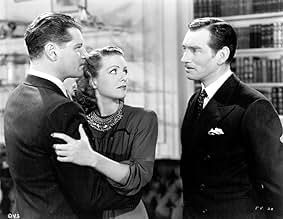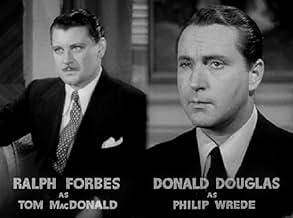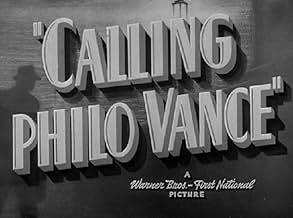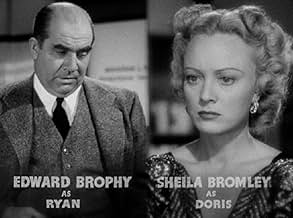Despite an exclusive contract with the U.S. government, designer Archer Coe's design is being bid on by German, Japanese, and Italian agents - until he's murdered.Despite an exclusive contract with the U.S. government, designer Archer Coe's design is being bid on by German, Japanese, and Italian agents - until he's murdered.Despite an exclusive contract with the U.S. government, designer Archer Coe's design is being bid on by German, Japanese, and Italian agents - until he's murdered.
- Director
- Writers
- Stars
Jimmy Conlin
- Dr. Doremus - Coroner
- (as Jimmy Conlon)
Wedgwood Nowell
- Brisbane Coe
- (as Wedgewood Nowell)
Herbert Anderson
- First Reporter
- (uncredited)
Henry Blair
- Hans Snauble
- (uncredited)
Egon Brecher
- Austrian Judge
- (uncredited)
- Director
- Writers
- All cast & crew
- Production, box office & more at IMDbPro
Featured reviews
This is a very cheaply made and predictable programmer--predictable since its plot is taken, almost verbatim, from two earlier films. It was literally like splicing two old movie together to make a new film!
The first 15 minutes of the film is lifted right out of PRIVATE DETECTIVE 62 (1933--starring William Powell), though the hero was stealing information from a French safe in the original film and in CALLING PHILO VANCE it involved stealing from an Austrian one. In both, he was working for the state department (though they denied this) and in both cases he was deported back to the US--only to have the boat's captain be told to return the man just as they are pulling into New York harbor--at which point the man jumps overboard and the rest of the film begins. It's so exact that they are practically the same film in the first reel.
Following this narrow escape, the plot is THE KENNEL MURDER CASE (also starring Powell). I am sure of this because I just saw both 1930s films in the last month. In fact, in many places it was word-for-word the same--so much so that I couldn't stand watching the film again--especially because James Stevenson on his best day doesn't even come close to the charm and style of William Powell's version of Philo Vance. It's like having Lee Majors play the lead in High Noon instead of Gary Cooper (this DID happen) or Timothy Dalton play "Rhett Butler" instead of Clark Gable (this, sadly, also DID happen)!! So, unless you've never seen the near-perfect KENNEL MURDER CASE (which earned a well-deserved 9 from me), don't even bother with this by-the-numbers re-make. It just isn't worth your time. And, for that matter, PRIVATE DETECTIVE 62 is also quite superior to CALLING PHILO VANCE. In fact, just WHO is this James Stevenson and why is he stealing from William Powell?!
The first 15 minutes of the film is lifted right out of PRIVATE DETECTIVE 62 (1933--starring William Powell), though the hero was stealing information from a French safe in the original film and in CALLING PHILO VANCE it involved stealing from an Austrian one. In both, he was working for the state department (though they denied this) and in both cases he was deported back to the US--only to have the boat's captain be told to return the man just as they are pulling into New York harbor--at which point the man jumps overboard and the rest of the film begins. It's so exact that they are practically the same film in the first reel.
Following this narrow escape, the plot is THE KENNEL MURDER CASE (also starring Powell). I am sure of this because I just saw both 1930s films in the last month. In fact, in many places it was word-for-word the same--so much so that I couldn't stand watching the film again--especially because James Stevenson on his best day doesn't even come close to the charm and style of William Powell's version of Philo Vance. It's like having Lee Majors play the lead in High Noon instead of Gary Cooper (this DID happen) or Timothy Dalton play "Rhett Butler" instead of Clark Gable (this, sadly, also DID happen)!! So, unless you've never seen the near-perfect KENNEL MURDER CASE (which earned a well-deserved 9 from me), don't even bother with this by-the-numbers re-make. It just isn't worth your time. And, for that matter, PRIVATE DETECTIVE 62 is also quite superior to CALLING PHILO VANCE. In fact, just WHO is this James Stevenson and why is he stealing from William Powell?!
One of the weakest Philo Vance films: a pointless remake of "The Kennel Murder Case", with a blander cast. But if you haven't seen "Kennel", you may still find the story ingenious. The then-topical WWII elements look out of place now in a Philo Vance mystery. ** out of 4.
Warner Brothers probably of all the studios loved remaking its films. I guess Jack Warner thought it saved on buying new properties. Calling Philo Vance after a brief prologue updating the story to have Vance working for the State Department investigating the theft of airplane designs, it becomes almost a word for word remake of The Kennel Murder Case. Even the character names remain the same. Whole bits of dialog from the original are reused in this one.
Too bad they couldn't have gotten William Powell as well. But he was over at MGM keeping Nora and Asta in line. So James Stephenson became the latest in a long line of Vances. Philo Vance would soon fade from the screen.
Stephenson is serviceable, but lacks Powell's unique debonair charm. And of course we've seen it all before.
Too bad they couldn't have gotten William Powell as well. But he was over at MGM keeping Nora and Asta in line. So James Stephenson became the latest in a long line of Vances. Philo Vance would soon fade from the screen.
Stephenson is serviceable, but lacks Powell's unique debonair charm. And of course we've seen it all before.
While I do like JAMES STEPHENSON as an actor (he was excellent in THE LETTER with Bette Davis), he lacks the sort of debonair charm needed for the role of Philo Vance in CALLING PHILO VANCE. However, that's not integral to your enjoyment of this updating of "The Kennel Murder Case" which was made in '40 when the Nazis were making big strides during World War II.
Secret stolen plans for a bomber falling into the hands of German agents is the crux of the matter here, to the tune of $250,000. The story begins with Vance accepting an assignment in Vienna where he is trying to find out whether Archer Coe is selling aircraft plans to a foreign country. But the main story begins when he's deported to the U.S., escapes authorities and returns to investigate the case for Chief Investigator Markham (HENRY O'NEILL).
The wealthy household where Coe died in a locked room, is at first ruled as the scene of a suicide but soon evidence proves it to be a murder and there are several suspects--among them, RALPH FORBES, DONALD DOUGLAS and MARTIN KOSLECK, in an unusual role as a butler. Kosleck usually played German spies in all the Warner war films.
Under Stanely Clements' direction, the tale moves quickly to an all too abrupt conclusion with very little explanation given for the intricate murder plot. While not exactly plausible, it does make an interesting mystery for who-dun-it fans with some clever touches in the script.
But the main disappointment lies in not having a satisfactory actor in the Philo Vance role.
Secret stolen plans for a bomber falling into the hands of German agents is the crux of the matter here, to the tune of $250,000. The story begins with Vance accepting an assignment in Vienna where he is trying to find out whether Archer Coe is selling aircraft plans to a foreign country. But the main story begins when he's deported to the U.S., escapes authorities and returns to investigate the case for Chief Investigator Markham (HENRY O'NEILL).
The wealthy household where Coe died in a locked room, is at first ruled as the scene of a suicide but soon evidence proves it to be a murder and there are several suspects--among them, RALPH FORBES, DONALD DOUGLAS and MARTIN KOSLECK, in an unusual role as a butler. Kosleck usually played German spies in all the Warner war films.
Under Stanely Clements' direction, the tale moves quickly to an all too abrupt conclusion with very little explanation given for the intricate murder plot. While not exactly plausible, it does make an interesting mystery for who-dun-it fans with some clever touches in the script.
But the main disappointment lies in not having a satisfactory actor in the Philo Vance role.
This is an adequate afternoon B-feature that probably served more as a warning against fifth-columnists than it actually entertained anyone. It all centres around attempts by the Axis powers to obtain access to the designs of "Archer Coe" (the briefest of appearances from Richard Kipling). Now he has an exclusive arrangement with the Americans so when he is found murdered, it falls to the wily, suspicions and tenacious "Vance" (James Stephenson) to find out who the killers were and on whose malevolent behalf they were working? Did they manage to steal his secret plans? Now this is just a substantial reworking of "The Kennel Murder Case" (1933) - even down to whopping great chunks of the script being transferred, albeit updated, to allow for it's WWII scenario. Although all pretty lightweight and devoid of any real sense of jeopardy, Stephenson is actually quite engaging and there is a decent supporting effort from Edward Trophy ("Ryan") delivering some fun to this rather dry, procedural, crime drama. It's only an hour, and if you like the genre then there isn't really anything not to like - or memorable - about this.
Did you know
- TriviaAll the scenes involving the two murdered men are taken directly from the earlier mystery called The Kennel Murder Case (1933), in which William Powell played Philo Vance. In both movies, most of the dialog in the scenes pertaining to the murders and the investigation is exactly the same, word-for-word, which clearly indicates that the script from the 1933 film was adapted to the story for this film, which focuses on the theft of secret aircraft plans. However, in "The Kennel Murder Case", the plot concerns stolen Chinese art objects.
- GoofsRalph Forbes is credited onscreen as "Tom MacDonald," but throughout the film, he is called Taylor MacDonald.
- Quotes
Dr. Doremus - Coroner: [about the dead Archer Coe] There couldn't have been much of a struggle. His hair isn't even mussed.
Ryan: [Sardonically] Somebody must have blackjacked him and then combed his hair.
- ConnectionsEdited from Private Detective 62 (1933)
- SoundtracksI'm Happy About the Whole Thing
(uncredited)
Music by Harry Warren
Played when Vance and Ryan meet Grassi in the bar
Details
- Runtime
- 1h 2m(62 min)
- Color
- Sound mix
- Aspect ratio
- 1.37 : 1
Contribute to this page
Suggest an edit or add missing content






































